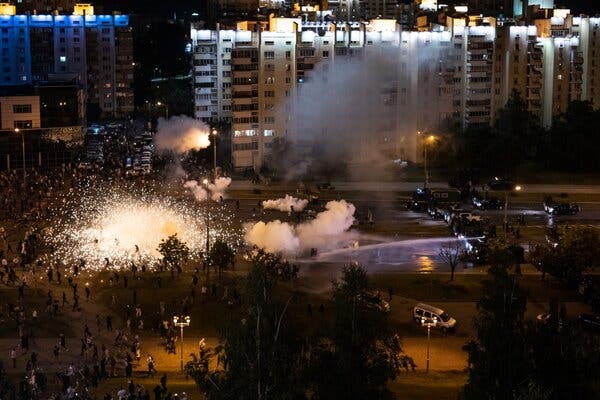MINSK, Belarus — Accounts of violent beatings of protesters and mass detentions mounted in Belarus on Thursday as the country’s embattled president, Aleksandr G. Lukashenko, deployed brute force to cling to power.
Widespread protests against Mr. Lukashenko, an authoritarian who has ruled for 26 years, have gripped the Eastern European country ever since he claimed victory in a presidential election on Sunday that his opponents and international governments widely considered fraudulent.
The protests were initially largely peaceful, but riot police officers and military forces responded with stun grenades and rubber bullets, and could be seen pummeling unarmed protesters with their boots and batons. Dozens of journalists were among the thousands detained; those who were released reported fierce beatings and horrific conditions in overcrowded detention centers.
The arrests and violence appeared geared at scaring people off the streets. But protests against Mr. Lukashenko continued in Minsk, the capital, and across the country on Thursday.
Footage circulating on social media showed workers walking off the job at the BelAZ truck factory in the city of Zhodzina, a crown jewel of Belarusian industry, chanting the protest movement’s message to Mr. Lukashenko — “Leave!”
Thousands of people, mostly women in white shirts, came to the city’s main avenue on Thursday afternoon, waving flowers to protest police violence. “Flowers are better than bullets,” one poster said.
The scene outside a pretrial detention center in Minsk was one of desperation and grief. Hundreds of people gathered, as they had for much of the week, looking for loved ones. They swarmed the occasional departing ambulance, seeking scraps of news.
People released from the jail said that they had not been fed and had to take turns to sleep or even sit. They were not allowed access to lawyers and had no way to tell their relatives where they were. At night, they said, they heard the sounds of beatings.
“The walls were thick, but we could still hear screams,” said Daria O. Andreyanova, 28, an actress. “When we asked for some fresh air, they would open a door and throw a bucket of water on us.”
Ms. Andreyanova showed a piece of toilet paper with holes in it, with the number of holes on each line representing a phone number that a person being released would call to pass along word about a cellmate still in prison.
Aleksandra V. Yurova, 31, who was detained after polls closed on Sunday, described her cell as a room of about 90 square feet with a table in the middle and a toilet that did not flush. There was only one bottle of water to be refilled and used by all of the inmates in the cell.
“We had 18 people in a cell designed for just four,” she said.
Ms. Yurova was released after one night, most likely because she has a small child, she said. Her partner was also detained, and she said she had not heard from him since. On Wednesday, she came to the jail to try to find out what had happened to him.
“I don’t want to live here anymore,” Ms. Yurova said, describing how the experience had changed her. “The conditions were just horrible.”
Early Friday, Deputy Interior Minister Alexander Barsukov told reporters that Belarus would release those detained in protests this week, Reuters reported.
But for now, more than 1,500 people detained during protests over the past days have gone missing, according to a list updated by a group of volunteers. Every day, they pass their list to the prison authorities, who mark whether those named are being held there. Some people have not been able to find their relatives for days, said Yelena S. Radaman, 35, one of the volunteers.
One of those seeking loved ones, Irina E. Brodskaya, 61, said she had not been able to find her daughter Nastya, 34, since Sunday night.
“I feel like I am in hell,” she said, wiping tears from her eyes.
From time to time, ambulances drove out of the prison compound, which is surrounded by barbed wire. They were immediately surrounded by people trying to find out who was inside. Rumors of beatings abounded.
“I force myself to sleep and to eat,” said Valeria I. Rytvinskaya, 22, a marketing specialist, who has been looking for her boyfriend since the first night of protests. “I haven’t been living since Sunday — I have been surviving.”
Foreign journalists released from detention described scenes of systematic beatings and abuse. The Russian independent news website Znak.com published an account by one of its journalists, Nikita Telizhenko, who said he had spent 16 hours detained with scores of others who were forced to lie face down in pools of blood, with some detainees at times lying on top of one another.
“The most brutal beatings were taking place all around: Blows, screams, cries could be heard from everywhere,” Mr. Telizhenko said. “I had the sense that some of those detained had broken bones — hands, legs, spines — because with the tiniest bit of movement they shouted in pain.”
The beatings continued inside a van when Mr. Telizhenko and others were transferred to a different detention center, he said. He was eventually released after the Russian Embassy interceded on his behalf.
Other correspondents also published harrowing accounts — noting that their status as foreigners and journalists had probably spared them the worst abuse. Stanislav Ivashkevich, a correspondent for the Belarus-focused television channel Belsat, which is based in Poland, described being detained in a three-person prison cell with 12 other people.
“Over the course of two days we were given one loaf of bread for the whole cell,” he wrote. “At one point we were taken out and forced to run a gauntlet of rubber batons.”
The Belarusian Association of Journalists said that it knew of at least 64 cases of journalists being detained since Sunday, and that at least seven had been severely beaten and injured.
One man died in custody, the Belarus authorities said on Wednesday. Michelle Bachelet, the United Nations High Commissioner for Human Rights, said that more than 6,000 people were believed to have been detained.
Those detained included “bystanders, as well as minors, suggesting a trend of massive arrests in clear violation of international human rights standards,” Ms. Bachelet said in a statement. “Even more disturbing are the reports of ill-treatment during and after detention.”
There were signs that the beatings were part of a systematic effort to quash the protests. Belarus state television on Wednesday showed footage of six young people who it said were protesters, their hands tied and their faces bruised and bloody.
“Are we going to do a revolution again?” an offscreen voice asks.
“Never again, ever,” one of those detained responds.
Ivan Nechepurenko reported from Minsk, and Anton Troianovski from Moscow.



















